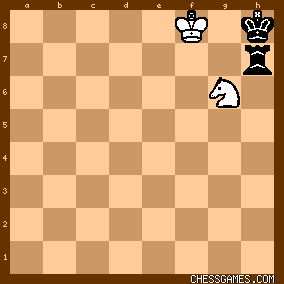| Jan-17-09 | | furrer: At least the sacrifice explorer isnt showing 80. Rh4+ |
|
| Jan-17-09 | | ruelas007: lol! <furrer>, does any have a collection named drawing sacrifices? |
|
| Jan-17-09 | | offtherook: Was Van Wely giving up and taking the draw, or was he really tired and actually dropped a rook for no reason? |
|
| Jan-18-09 | | Ipecac: <offtherook: Was Van Wely giving up and taking the draw, or was he really tired and actually dropped a rook for no reason?> Humor was the only weapon he had left in the game, so he used it. |
|
| Jan-18-09 | | Confuse: Its also possible that he was low on time, and his opponent didn't want to give the draw. : 0 |
|
| Jan-18-09 | | furrer: Is it possilbe to create a mate with N+K against K+R with the weak side winning? |
|
Jan-18-09
 | | Phony Benoni: <furrer> Well, it's easy enough to create such a position:

click for larger view
but forcing it would be another matter. |
|
| Jan-18-09 | | dakgootje: Well, the position was drawn either way, so I suspect his moves 71-80 were just hoping his opponent would be tired as well and make a mistake. I like the finish though ;) |
|
| Jan-19-09 | | Maynard5: What is surprising in this game is that White is not able to force the win in an endgame with a rook and three pawns against a knight and four pawns. Most such endgames on record have been won by the player with the rook. See for instance Alekhine vs. Junge, Salzburg, 1942, for an interesting example of this type of endgame. Black's defense in this position holds primarily because the pawns are blockaded, and because his pawns are more advanced. This makes it difficult for White to make any progress. |
|
| Jan-19-09 | | gazzawhite: <Phony Benoni> I believe that if one runs out of time, and it is possible to be checkmated (regardless of whether or not it can be forced), then they lose. I guess you already knew that though. |
|
Jan-19-09
 | | Phony Benoni: <gazzawhite> Yes, I know that rule, but it has never been one of my favorites. In my opinion, increments should always be used to try and avoid such situations. And, yes, I also know the argument that a player who runs out of time deserves to lose because he should have used his time more efficiently. That has some merit--but in a seven hour game where a player's flag falls when his opponent has one second on the clock, it makes no sense. Rules such as time limits are necessary for competitive play, but as far as possible they should not affect the result of a game which has been decided on the board. This is supposed to be chess, for goodness sakes, not Beat the Clock. |
|
| Jan-25-09 | | whiteshark: Loek van Wely and Lenier Dominguez followed a long line in a well-known Gruenfeld, with black sacrificing an exchange for a strong passed a pawn and white having a passive bishop on g3. White might still have been better, but when black managed to exchange queens, he picked off white’s weak e pawn for his advance a pawn. Even the rook and three pawns versus knight and four, after managing to exchange a pair of rooks, was not winnable and the competitors agreed to split the point after 64 [<??>] moves. fm rd1 report |
|





